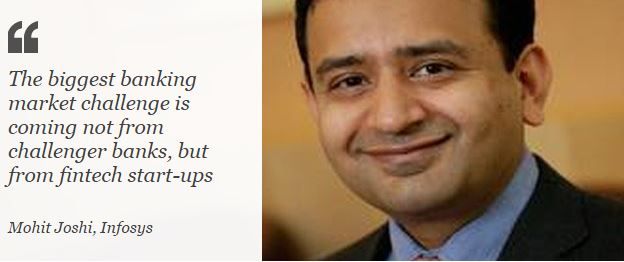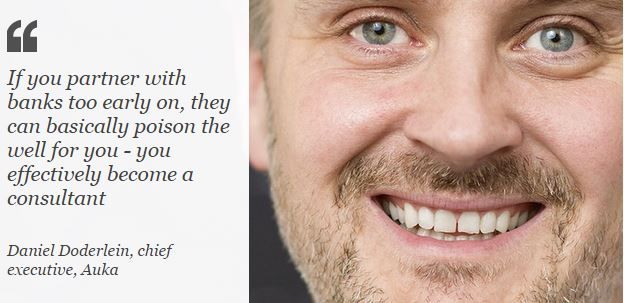
I guess my highlight of #Money2020Europe was moderating a discussion between Martin Blessing, CEO of Commerzbank, and Ricky Knox, CEO of UK digital-first start-up Tandem Bank.
Really interesting back 'n forth between ceos of Commerze Bank and Tandem Bank. #Money2020Europe pic.twitter.com/TsPmwXXUOd
— Kristian Luoma (@kluoma) April 6, 2016
We had a fascinating dialogue before the public debate, and an even more engaging discussion on stage if the tweets are anything to go by.
Many compared it to an old versus new school clash and probably thought it would be interesting to see the FinTech upstart knockout the Dinosaur ...
Old skool vs New School: @commerzbank vs @tandembank @money2020 #Money2020Europe pic.twitter.com/5HkfpJxA5I
— Michael Kent (@unclemikeyk) April 6, 2016
... but it didn’t go that way. In fact, the two speakers had more in common than many expected. For example, the old school bank owns mBank, one of the most innovative players in Poland; the upstart bank holds mBank up as an example to follow. The old school bank can onboard customers using a photo of you and your passport; the upstart bank can do this via an NFC tap of the passport. The old school bank has 1,000 branches and wants less; the upstart bank has one branch – the head office – and wants more.
What was particularly interesting for me is that they both have their challenges. The old school bank has 60 million customers and innovation has to bring them along at their pace - the customer sets the pace of change; the upstart bank has no customers and has to work out how to get any of the lethargic accountholders to bother to switch. The old school bank was caught out in the bank crisis and had queues of customers tapping on branch doors wanting to see the money; the upstart bank has to work out a way to get the money. The old school bank deals with regulators who create uncertainty and wonder what new requirement they’ll need to meet tomorrow; the upstart bank has to work out how to get the regulator to sign off on their plans and give them a licence. The old school bank has to manage legacy technologies and issues left over from mergers and acquisitions, such as the 2008 integration of Dresdner Bank into Commerzbank; the upstart bank has to work out what to develop themselves and what they need from third party providers, and the challenge of finding providers they can trust.
And so the conversation continued.
I was particularly interested to hear Martin talk about the problems the upstart banks will have if we ever leave a low interest environment. Imagine Number 26, Fidor, Tandem, Atom and more waking up after a year of enticing customers with the most attractive rates to find those rates now cost the customer 500 basis points more. How many neobanks would implode? Ricky reckoned this would only impact mortgage banks, but I was not so sure. In fact, walking away from unsecured debt in a higher interest world would impact the new banks the hardest first.
Equally, I was intrigued to hear the plans of some of these neobanks. For example, Atom are targeting five million customers in five years, and yet I don’t know of any neobanks that has achieved those sorts of numbers. Fidor has yet to reach 100,000 customers after eight years and Metro Bank has only got 175,000, even with branches. The best performing neobanks is probably Che! Banca in Italy, who organically grew to 500,000 customers before taking over Barclays Italian Retail Bank operations at the end of last year. Even with that acquisition, the bank still only has 750,000 clients across 140 branches.
At the end I asked Martin how he’d create a new bank if he started today, and Ricky what he’d do with a large incumbent like Lloyds if they acquired Tandem and he became CEO.
@Chris_Skinner question of the conference 'what would you prioritise if you were promoted to be the head of a legacy bank?' @money2020
— Jamie Campbell (@JCtheOriginal) April 6, 2016
Martin answered that he would build a new bank based upon the customer view of their needs on a digital platform first service; Ricky said he’d create a small team to develop the next generation bank and give them a seven-year timeframe to achieve it.
On that last point, it reminded me of the blog that is one of my most popular so far: the best job in banking is the Chief Cannibal Officer.
A #highlight of #Money2020Europe so far: @Chris_Skinner on stage with @rickyknox1 & Martin Blessing @money2020 pic.twitter.com/uptrcd6uQN
— solarisBank (@solarisBank) April 6, 2016
Anyways, intriguingly the BBC also picked up on this subject today:
Why are old banks hooking up with younger models?
Banks around the world are realising that in the rapidly developing world of smartphones and apps they are at risk of falling behind in the innovation race. Fresh-faced financial technology start-ups (fintechs) are coming up with new mobile-first services - payments, loans, money transfers, digital currencies - and threatening to steal customers, particularly younger ones. Investment bank Goldman Sachs estimates that $4.7tn (£3.3tn; €4.1tn) in revenue for traditional financial services is at risk of being displaced by these fintech upstarts. "From Amazon's transformation of the retail sector, to Uber's revolution in personal transportation, banks are taking heed of what is happening in other industries," says Mohit Joshi, global head of financial services at tech consultancy, Infosys.

This is why many old banks have been flirting with younger models in an effort to stay hip. But are such apparently mismatched relationships doomed to failure?
'Vibrant community'
At the southern tip of Africa, in Cape Town, global banking giant Barclays is busy developing a secret tech solution to make it easier for consumers to make payments online. But it has called on the expertise of local tech start-up Peach Payments to help, and the two are working on a product aiming to change the way people transact online in emerging markets. Rahul Jain, co-founder of Peach Payments, says: "We are helping them actually design the product since we have the feedback from the market and understand e-commerce from the perspective of the merchant and the consumer. This is invaluable feedback which the bank doesn't have normally." From the bank's point of view, "it's about recognising that not all innovation has to happen within our own four walls," says Lubaina Manji, head of Barclays' group innovation office. "There is a talented and vibrant start-up community globally, which Barclays can work with to co-create the future of financial services." Peach Payments was one of 10 start-ups to participate in a 13-week Tech Lab Africa accelerator programme hosted by Barclays in Cape Town in December. The bank also runs programmes and hubs in the UK, USA, and Israel, and has plans to launch activities in India and Lithuania.
Another start-up taking part in the programme was Nigerian firm Aella Credit, which has built an instant loan approval and payment platform that relies on data analytics to identify creditworthy borrowers. Aella Credit director Akinola Jones says his firm has remained in constant communication with Barclays' innovation team since taking part in the programme. But sceptics will point out that Barclays' recent decision to sell its Africa operations shows that such partnerships may be more to do with playing catch-up than leading from the front.
Threat or opportunity?
All those attractive fintech start-ups may appear tempting, but there is no consensus among the big beasts on the best way to get a piece of the action. Some banks, such as Santander, National Bank of Australia and Citigroup, are providing venture funding and seed investments for fintechs. Others, such as Barclays, Bank of America, and Sberbank, are creating or partnering with start-up incubator programmes. Others still, like Spain's BBVA, are simply buying them up.
"We're yet to see which type of approach will prove the most fruitful, but industry experts are unanimous in their belief that those banks which bury their heads in the sand and fail to acknowledge the impact of fintechs are putting their entire business at risk," says Vincent Bastid, chief executive of Efma, a research and networking organisation for financial institutions. Efma has just produced a report looking at the impact of fintechs on the established financial services industry.
'Poison the well'
In a similar example, French bank BNP Paribas has linked up with Swiss fintech accelerator, Fusion - a partnership the bank says is "at the heart" of its digitisation plan. Based in Geneva, Fusion takes on 10 start-ups each year, and puts them through a 12-month intensive programme of mentoring, funding, and access to markets. Kim Potvin, chief operating officer at BNP Paribas (Suisse), believes the partnership is already yielding tangible results, and will help its Swiss arm become "a leading player in the financial services of the future."
Fusion's programme director Sebastien Flury describes the partnership as a "win-win" situation, with benefits for banks and start-ups alike. But if all this sounds a little too cosy, entrepreneur Daniel Doderlein, chief executive of Norwegian cloud-based mobile payments platform Auka, has this stark warning for fellow fintech start-ups.

By building his own platform, mCash, and establishing a consumer business first, Mr Doderlein found he was then able to sell it to initially sceptical banks from a position of strength. Norway's Sparebank 1 bought the mCash business in October last year. And Gareth Mellon of research firm Frost & Sullivan warns that the jury is out on just how effective such partnerships are. Many are purely "defensive strategies" by the banks, he says, and have proved difficult to integrate within existing business models. "While fintechs have brought heightened innovation, they remain limited in their scope and, in many ways, are forced to rely upon the established players to ensure market adoption," says Mr Mellon.
'Bloodbath'
Perhaps the biggest threat to banks, in Europe at least, is the European Commission's forthcoming Payment Services Directive 2, due to come into force early in 2018. This aims to open up electronic payments to more competition by forcing banks to open up their IT systems to new entrants, thus encouraging innovation. "If you don't provide a mobile payments app to your customers, your risk being marginalised," says Mr Doderlein. "It's going to be a bloodbath." Perhaps the banks need tech start-ups more than tech start-ups need the banks.
Chris M Skinner
Chris Skinner is best known as an independent commentator on the financial markets through his blog, TheFinanser.com, as author of the bestselling book Digital Bank, and Chair of the European networking forum the Financial Services Club. He has been voted one of the most influential people in banking by The Financial Brand (as well as one of the best blogs), a FinTech Titan (Next Bank), one of the Fintech Leaders you need to follow (City AM, Deluxe and Jax Finance), as well as one of the Top 40 most influential people in financial technology by the Wall Street Journal's Financial News. To learn more click here...

